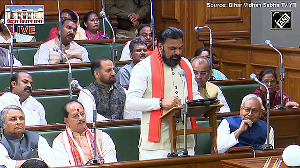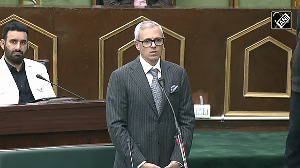With the decision on the purchase of Advanced Jet Trainer still hanging fire, the Indian Air Force has got into the act to opt for the Intermediate Jet Trainer, being indigenously built by the Bangalore-based Hindustan Aeronautics Ltd.
HAL Chairman N R Mohanty disclosed to the media in Bangalore on Thursday that the IAF had placed an order for the supply of 16 IJTs to its fleet in the coming years, as an interim measure pending a government decision on acquiring the much-touted AJTs.
"The IJT is ready for its first maiden flight later this month. Keeping in view HAL's expertise in developing the Light Combat Aircraft and manufacturing the Indian version of Sukhoi-30 MKI fighter aircraft, the IAF has expressed total confidence in HAL to go ahead with the IJT project," Mohanty claimed.
The IAF has been waiting over the years for a trainer jet to train its rookie pilots to fly and operate its latest fleet of fighter aircraft such as Sukhois, MiG variants, and the upcoming LCAs.
With the much-awaited AJT deal taking time, the IAF has been looking for the IJT to replace its ageing fleet of propeller-driven Surya Kiran Mark II trainer jets to enable its young pilots to graduate from sub-sonic to supersonic fighters.
The sub-sonic IJT is a by-product of LCA, and being developed in association with other defence organisations such as the Aeronautical Development Agency and the Defence Research and Development Organisation.
Many US and European companies are also partnering with HAL to supply sub-systems and critical components for the IJT project.
As its main customer, the IAF has been sourcing all its aircraft and helicopter requirements from the Rs 2,775-crore (Rs 27.75 billion) HAL.
Over the decades, HAL has been delivering and servicing IAF fleet in collaboration with the Russian, French and UK aerospace/aviation companies.
IAF chief Air Chief Marshal S Krishnaswamy, who is Bangalore for the ongoing five-day Aero India 2003 show, has also committed to grant Rs 300 crore (Rs 3 billion) to HAL for designing and developing the Light Combat Helicopter in the next 24 months.
"We have assured the IAF to deliver the LCH by the next Aero India show in 2005. It's a combat variant of the Advanced Light Helicopter in 5.5-ton class, with a narrow fuselage having pilot and co-pilot/gunner in tandem configuration," Mohanty.
Defence Minister George Fernandes unveiled an all-metal life size mock-up of the LCH at the air show on Wednesday at the HAL pavilion. The LCH incorporates a number of stealth features and crashworthy landing gear for better survivability.
The IAF has also permitted HAL to upgrade its fleet of Jaguars, MiG 27, Mirage 2000, and Cheetah helicopters with new engines for operating in high altitudes and heavier payloads.
"The order book of HAL is healthy and growing. We are setting a revenue target of Rs 4,000 crore (Rs 40 billion) for the ensuing fiscal year (2003-04), which will be an increase of Rs 1,000 crore (Rs 1 billion) from the projected turnover of Rs 3,000 crore (Rs 30 billion) for the current fiscal year (2002-03)," Mohanty asserted.
As reported earlier, HAL has also signed a major deal with the Israeli Aircraft Industry to fit its avionics modules and electronic warfare systems in the ALH variants for the global market.
"We are setting up a 50:50 joint venture with IAI to equip the cockpit of ALHs with the latest avionics software and weapon systems. IAI will market the copters globally, while HAL will look after the Indian market, including the three defence services, the Indian Coast Guard, and the civilian sector," Mohanty affirmed.
Pending certification from the Director General of Civil Aviation for the civilian version of the ALH, HAL has secured its first order from the Bombay-based Azal Helicopter Ltd, which charters copters for offshore services.
HAL has also signed a deal with the French aerospace company, Turbomeca, for jointly designing, developing and producing in India the Shakti engines for the twin-engined ALH.
The Shakti engine, which will be the Indian version of the TM-333-2B2 engine of Turbomeca, named Ardiden after a peak in France, is specifically suited for higher altitudes with more payload.
To manufacture small aero engines for the civilian aircraft and turbo chargers for the Indian Railways, HAL has signed a deal with another French aviation firm, Snecma at the air show.
A joint venture is also being set up with Snecma, which has set its own subsidiary in India last year, for forging and casting work.
A similar agreement has been reached with Rolls-Royce of the UK for exporting ring forgings and castings, valued at $5 million over the next three years.
A proposal to set up two centers of excellence in the Bangalore complex of HAL at a cost of Rs 75 crore (Rs 750 million) for machining has been cleared by the company's board early this week. The hangers will be up in the next 12-18 months.
"The first batch of ring forgings is being exported to Rolls-Royce this month. They will be incorporated into the British firm's civil aero engines for worldwide operations," Mohanty declared.
HAL has bagged a $9 million order to undertake sub-assembling work for Su-30 aircraft from the Russian aerospace company Irkut Research and Production Corporation.






 © 2025
© 2025